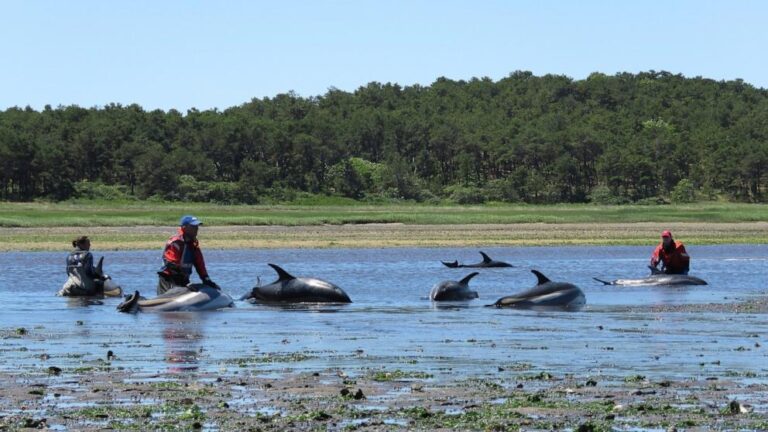The beach where the dolphins are stranded is covered in “dangerous” mud.
According to the International Fund for Animal Welfare (IFAW), approximately 125 dolphins are currently stranded on the beach near Wellfleet, Massachusetts.
The Atlantic white-sided dolphin was stranded on Herring River’s Great Island (also known as “the Gut”), which is extremely difficult to access and covered in “dangerous mud,” IFAW communications director Stacey Hedman said in a statement Friday.
Hedman said 10 dolphins were already dead before IFAW staff arrived on the scene, calling the incident the largest mass stranding the organization has ever responded to.
Low tide occurred at 11:23 a.m., Hedman said. Due to the large number of distressed dolphins, the plan is to triage and assist as many of them as possible before trying to refloat them and group them together.
Aerial footage taken by ABC Boston affiliate WCVB showed dozens of dolphins lying motionless on the shoreline Friday afternoon, many of them covered in wet towels placed by rescuers to keep their skin from drying out.
The video shows volunteers beginning to rescue the dolphins, and soon after, a larger crowd arrives, also appearing to help.
At least 25 IFAW staff and 100 volunteers were on the scene by late afternoon, Hedman said. They continued to guide the pod using three small boats in the water and underwater pingers to guide the dolphins in the right direction as high tide approached.
Temperatures on Friday were cooler than recent days, but Hedman said the dolphins could risk sunburn or overheating if they stayed on the beach until the tide came in, which is expected to occur around 5:34 p.m.
IFAW has had success capturing pods of Pacific white-sided dolphins in the past, Hedman said.
Experts say Cape Cod is a global hotspot for strandings because of the curvature of the coast and the tides.
It’s unclear why dolphins become stranded, Hedman said.

